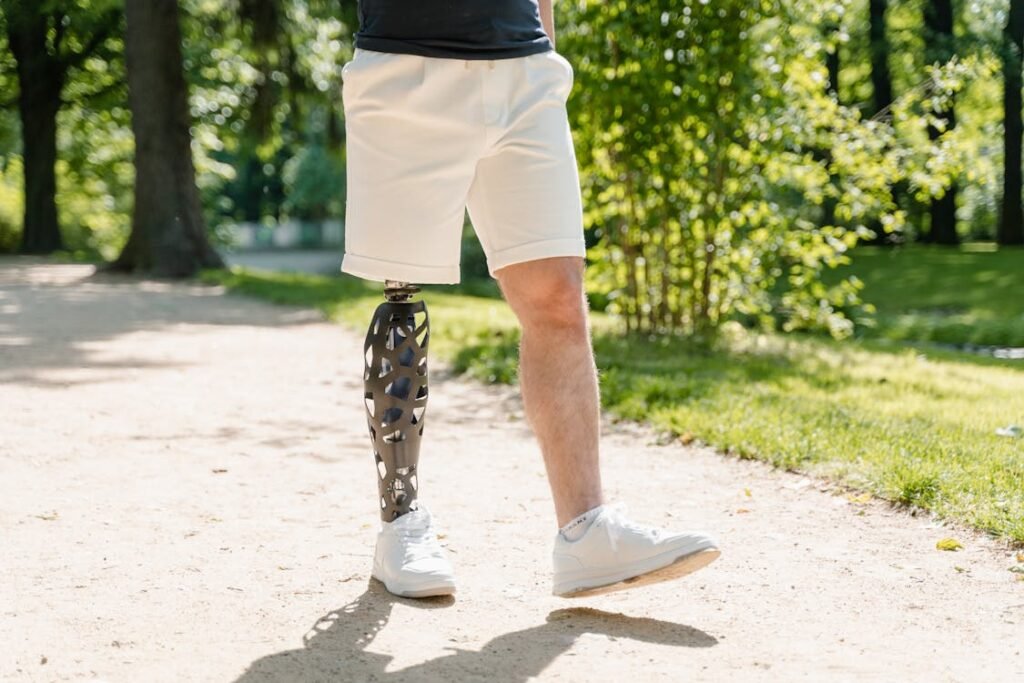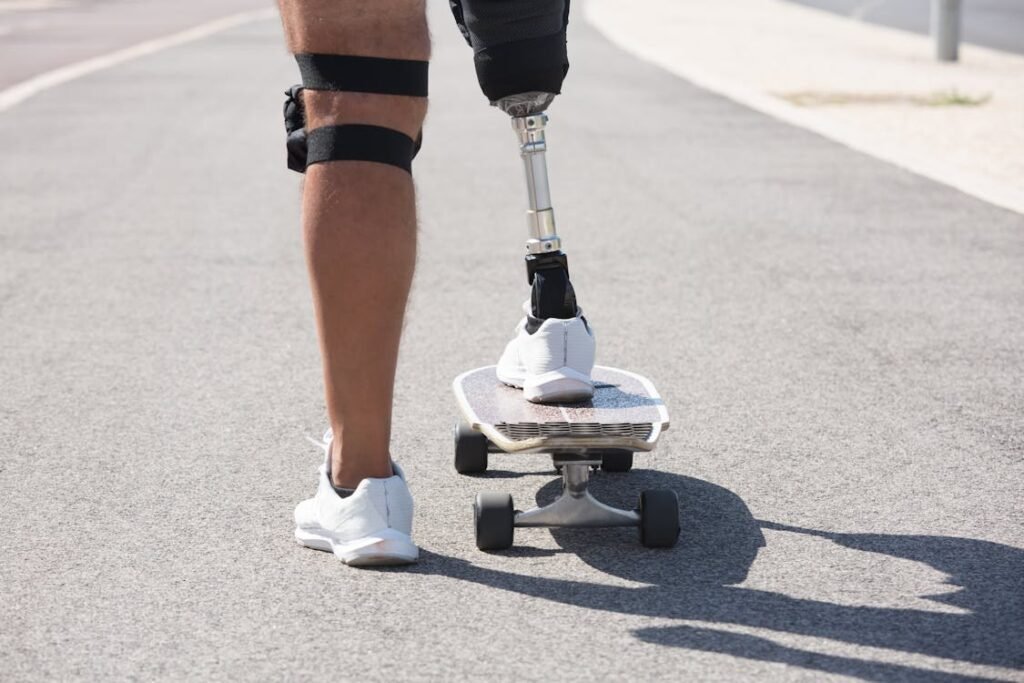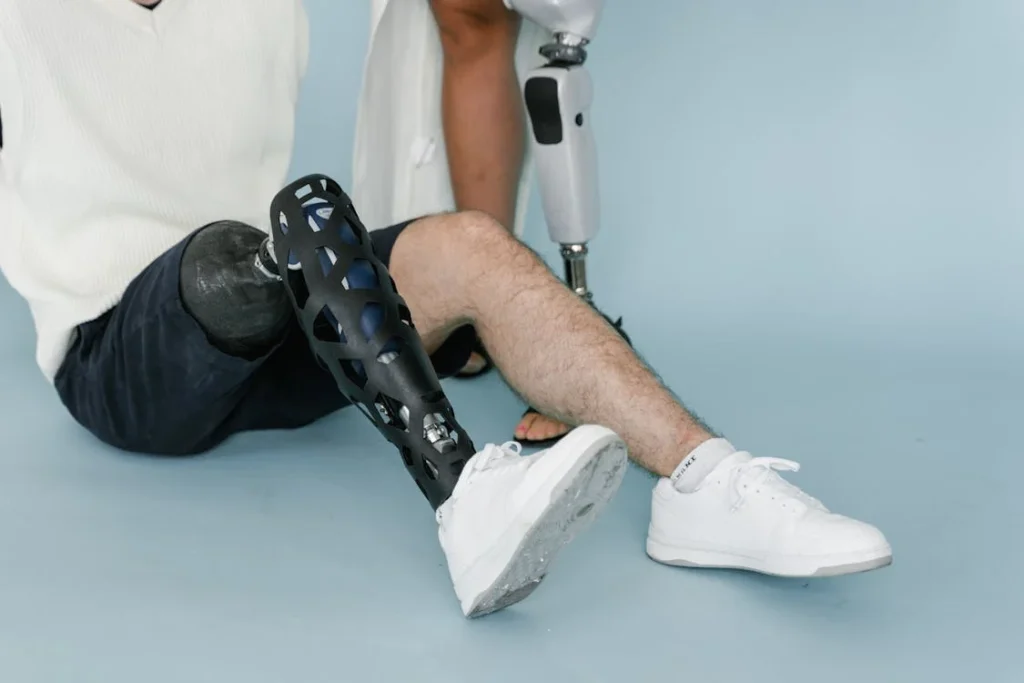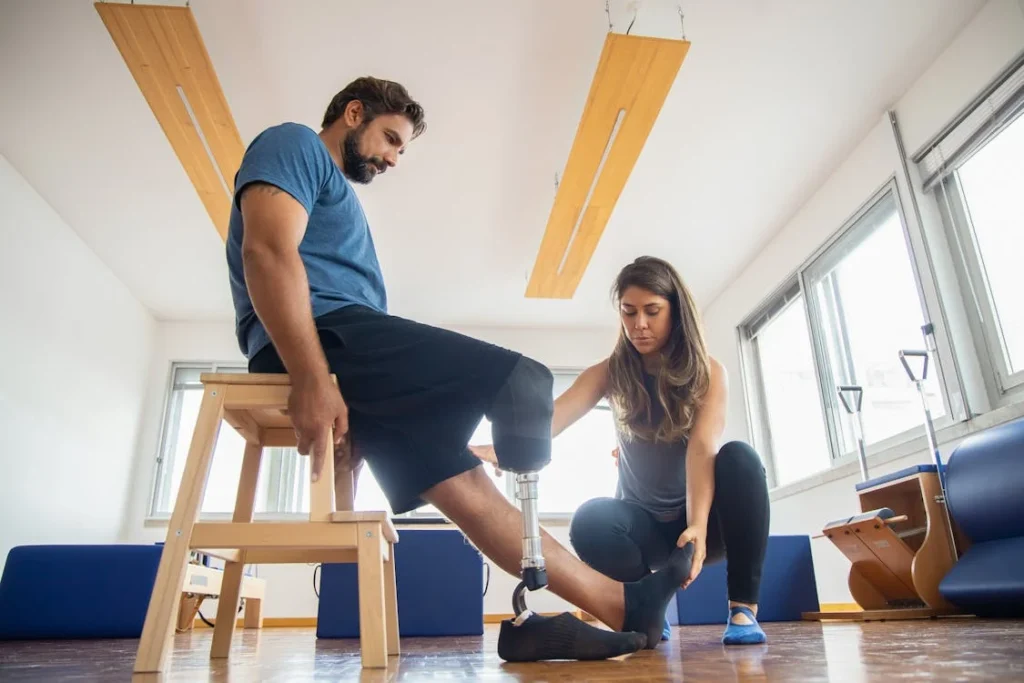Learning to use a prosthetic is not something that happens overnight. It takes time, patience, and continuous effort. Some days, progress feels easy, while on others, frustration sets in. This is completely normal. Staying motivated through long-term prosthetic training is one of the biggest challenges users face. The journey is filled with small victories and setbacks, and maintaining a positive mindset makes all the difference.
The key to success is not just physical training but also mental resilience. Motivation is what keeps you going, even when progress feels slow. Whether you are adjusting to a new prosthetic or refining your skills with an existing one, the right mindset and strategies will help you stay committed.

Building the Right Mindset for Success
Prosthetic training is not just about learning movements—it is about training your mind to stay strong, patient, and determined. The way you think about the process directly affects your ability to progress.
If frustration takes over, it can slow you down. But if you focus on small victories, you will find the strength to keep going.
Accepting the Learning Curve
Every new skill takes time to master, and using a prosthetic is no different. It is important to accept that progress may not always be linear.
Some days, things will feel easy, and on other days, even simple tasks may seem challenging. This is a normal part of the learning process. The key is to remind yourself that setbacks do not mean failure. They are simply part of the journey.
Instead of getting discouraged, celebrate the small improvements. Maybe today, you managed to pick up a cup without hesitation, or you walked a little farther than yesterday.
These moments matter. Focusing on what you have achieved rather than what is still difficult helps keep motivation high.
Setting Personal Goals
Having clear, realistic goals gives direction to your training. It is not just about learning to use your prosthetic but about integrating it into your daily life in a way that feels natural.
Your goals should be personal to you. If you love to cook, your focus might be on improving your grip strength to hold utensils with ease. If you enjoy outdoor activities, you might aim to increase your endurance for walking or running.
Breaking larger goals into smaller steps makes progress feel more achievable. Instead of thinking, “I need to master my prosthetic,” shift your focus to smaller wins, like improving control, getting comfortable wearing it for longer periods, or practicing fine motor movements.
Every milestone you reach builds momentum and keeps you motivated.
Finding Purpose in the Process
Training can sometimes feel repetitive, but reminding yourself why you are doing it can keep you going. The ability to regain independence and do the things you love is worth the effort.
Visualizing what you want to achieve—whether it is shaking hands confidently, riding a bike, or returning to work—can serve as a powerful source of motivation.
Connecting with others who have successfully adapted to their prosthetics can also provide inspiration. Hearing real stories of individuals who have overcome similar challenges can make your own goals feel more attainable.
Engaging with a community, whether online or in person, reminds you that you are not alone in this journey.

Overcoming Frustration and Staying Consistent
One of the biggest challenges during long-term prosthetic training is managing frustration. Some days, progress may feel slow, and you might wonder if you are improving at all. This is completely normal.
The key to success is learning how to work through these moments and keep going.
Learning to Manage Frustration
When things do not go as planned, it is easy to feel discouraged. Instead of letting frustration take over, take a step back and recognize that learning takes time.
Remind yourself of how far you have already come. Even the fact that you are showing up for training, practicing, and pushing yourself is progress.
Taking breaks when needed is also important. If a particular movement is not working, stepping away and coming back later with a fresh perspective can make a difference.
Sometimes, the brain just needs time to process new skills before they start feeling natural. Giving yourself grace and allowing for rest prevents burnout and helps maintain motivation in the long run.
Making Training a Daily Habit
Consistency is one of the most important factors in prosthetic training. The more you practice, the more natural your movements will become.
However, it is also important to make training feel like part of your daily life rather than a chore. Instead of seeing it as something separate, integrate it into your routine in ways that feel meaningful.
If you are working on grip strength, try using your prosthetic to do everyday tasks like picking up a glass of water, folding clothes, or turning a doorknob.
If you are learning to walk with a prosthetic leg, practice moving around the house, walking short distances outside, or taking small steps toward activities you enjoy. Making training feel purposeful helps maintain engagement and prevents it from feeling repetitive.
Finding Motivation in Everyday Progress
Sometimes, motivation comes from unexpected places. A simple moment—like successfully tying your shoelaces, carrying a grocery bag, or walking without focusing on every step—can serve as a powerful reminder of why you are training.
Recognizing these small wins builds confidence and reinforces the idea that progress is happening, even if it is not always obvious.
For those using advanced prosthetics like Grippy™, motivation can also come from exploring new ways to use the device. As technology improves, so do the possibilities.
Trying out different movements, testing the limits of what the prosthetic can do, and finding creative solutions to everyday challenges can turn training into an exciting experience rather than a task.

Staying Mentally Strong Through the Journey
Long-term prosthetic training is not just about physical endurance; it is also about mental resilience. Staying motivated requires a strong mindset, a sense of purpose, and the ability to push through moments of doubt.
While physical exercises help with mobility and control, mental strength determines how well you adapt and continue progressing.
Shifting Your Perspective on Challenges
Every challenge in prosthetic training is an opportunity to grow. Instead of seeing difficulties as obstacles, view them as stepping stones toward independence.
A movement that feels impossible today may become second nature in a few months. Every time you face a setback, remind yourself that progress is never instant, but persistence leads to mastery.
Keeping a journal of your experiences can help shift your mindset. Writing down small achievements, even as simple as improving your grip or walking longer distances, creates a record of success that you can look back on during tough times.
Seeing how far you have come serves as a reminder that every effort is worth it.
Surrounding Yourself with Positive Support
Recovery and training are easier when you have the right support system. Family, friends, and prosthetists play a huge role in motivation. Having someone to encourage you, celebrate small wins, and remind you of your progress can make a world of difference.
Connecting with others who have been through similar journeys can also provide valuable insight. Support groups and online communities allow you to learn from people who have faced the same struggles and found ways to overcome them.
Hearing about their experiences can inspire new strategies and remind you that you are not alone in this process.
Keeping the End Goal in Mind
On difficult days, it is easy to focus on the struggles rather than the bigger picture. Remind yourself why you started this journey. Whether it is regaining independence, returning to work, or participating in a favorite hobby, keeping your long-term goal in mind helps sustain motivation.
Visualization can be a powerful tool. Picture yourself confidently using your prosthetic in everyday situations. Imagine the freedom and confidence that come with mastery. When training feels exhausting, thinking about the end result can reignite your determination.
For those using advanced prosthetics like Grippy™, setting new challenges can make training exciting. Trying different grips, testing strength levels, or experimenting with more complex movements can add variety and make learning feel less routine.

Turning Training into a Lifelong Journey
Prosthetic training does not stop once you become comfortable with basic movements. The journey continues as you refine skills, explore new possibilities, and challenge yourself in different ways.
Staying motivated long-term requires viewing prosthetic use as an evolving process rather than a fixed goal.
Embracing Adaptability and Growth
One of the most valuable lessons in prosthetic training is learning to adapt. Your body, lifestyle, and needs will change over time, and so will your relationship with your prosthetic. Accepting this natural progression helps prevent frustration and keeps you open to continuous learning.
If you start using a more advanced prosthetic, such as Grippy™, there will be a new learning curve. Instead of feeling discouraged by the adjustment period, treat it as an opportunity to expand your abilities.
The more open you are to change, the easier it will be to grow with your prosthetic rather than feeling restricted by it.
Exploring New Activities and Challenges
Staying motivated becomes easier when you integrate your prosthetic into activities you enjoy. Whether it is sports, music, art, or daily tasks, finding ways to use your prosthetic in creative and fulfilling ways makes training feel more rewarding.
For upper-limb prosthetic users, exploring tasks like playing an instrument, cooking, or even gaming can make practice more engaging.
For lower-limb prosthetic users, activities like hiking, dancing, or swimming can turn training into an enjoyable experience rather than a routine. Every new challenge you take on strengthens your skills and builds confidence.
Celebrating Every Step Forward
Progress in prosthetic training is not measured by perfection but by persistence. There is no finish line—only continuous improvement.
Celebrating small victories, whether it is successfully gripping an object, walking longer distances, or simply feeling more at ease with your prosthetic, reinforces the belief that you are capable of adapting and thriving.
Having a prosthetic is not about replacing what was lost—it is about discovering new strengths.
The journey may have difficult moments, but with determination, support, and the right mindset, long-term prosthetic training can become a path to greater independence, confidence, and fulfillment.

The Role of Technology in Keeping Motivation High
Advancements in prosthetic technology have made long-term training more engaging and effective. Modern prosthetics are not just functional—they are designed to adapt, improve, and enhance the user experience over time.
By understanding and embracing these innovations, training becomes more exciting and less repetitive.
Making the Most of Smart Prosthetics
Today’s prosthetics, such as Grippy™, offer advanced features that can be customized to suit individual needs. Sensors, grip adjustments, and intuitive controls allow users to perform a wider range of movements with greater precision.
Learning to use these features takes time, but exploring them in everyday life keeps motivation high.
Gamified rehabilitation programs, which combine prosthetic training with interactive exercises, also make the process more enjoyable.
These programs challenge users to refine their movements in a structured yet fun way, turning practice into a rewarding experience. The more you engage with these tools, the more confident and skilled you become.
Understanding the Learning Process of Prosthetics
Unlike natural limbs, prosthetics require deliberate training and adaptation. Just like learning to write with your non-dominant hand, training your brain to control a prosthetic effectively takes repetition and patience.
Understanding that this is a learning process—rather than an immediate skill—helps reduce frustration.
By tracking progress through videos or journaling, users can visually see how much they have improved over time. Comparing movements from the early days of training to months down the line reinforces the idea that consistency leads to success.

Mental Health and Motivation in Prosthetic Training
Long-term prosthetic training is as much a mental challenge as it is a physical one. While learning to use a prosthetic requires patience and practice, maintaining a positive mindset is equally important.
The mental and emotional journey can be filled with highs and lows, and understanding how to navigate these feelings is crucial for long-term success.
Recognizing the Emotional Highs and Lows
Recovery and adaptation come with a mix of emotions. Some days, it feels like progress is steady, and confidence is high. Other days, frustration, fatigue, or self-doubt can take over.
It is natural to experience these emotional shifts, but the key is to acknowledge them without letting them define the journey.
One of the most common feelings during prosthetic training is impatience. The desire to master a movement quickly can lead to frustration when things do not go as expected. In these moments, it helps to step back and remind yourself that adaptation takes time.
Just like learning any complex skill—whether playing an instrument or speaking a new language—proficiency is built gradually.
External factors can also affect mental health. The way people react to an amputation, the level of support from family and friends, and even daily life stressors can influence motivation.
It is important to recognize that these external pressures are separate from personal progress. What matters most is personal commitment and persistence, regardless of outside opinions or temporary setbacks.
The Role of Self-Compassion in Progress
Being kind to yourself throughout prosthetic training is essential. Many people hold themselves to high standards and feel disappointed when progress is slower than expected.
However, no one expects perfection overnight. Self-compassion allows room for learning, mistakes, and growth.
Instead of focusing on what is difficult, celebrating small improvements can change the way the brain processes the experience. Every time a new movement becomes easier, it is a sign that progress is happening.
Acknowledging these moments creates a positive feedback loop, reinforcing motivation and making training feel more rewarding.
Finding Strength in Routine and Structure
One of the most effective ways to maintain mental resilience is by establishing a structured routine. When training becomes part of a daily schedule, it feels less like an effort and more like a natural part of life.
Routines help create consistency, which is key for both physical progress and emotional stability.
Practicing at the same time each day, incorporating prosthetic use into everyday tasks, and setting aside moments for reflection can create a rhythm that keeps motivation steady.
Over time, the brain and body adapt to this structure, making training feel like a natural habit rather than a chore.
Using Visualization to Stay Motivated
Mental imagery is a powerful tool in rehabilitation and skill development. Athletes, musicians, and performers use visualization techniques to enhance their abilities, and the same method can be applied to prosthetic training.
By picturing movements in the mind before executing them, the brain creates neural pathways that support actual physical performance.
Before attempting a new task, taking a moment to visualize the process can improve confidence.
Whether it is imagining the precise way fingers should move to grip an object or mentally rehearsing the steps of walking smoothly with a prosthetic leg, visualization strengthens the mind-body connection.
This practice helps reduce anxiety and improves performance, making tasks feel more natural over time.
The Power of a Support System
Mental health and motivation are deeply influenced by the environment and people surrounding an individual. Having a strong support system—whether it is family, friends, therapists, or fellow prosthetic users—can make a significant difference.
Encouragement from loved ones can provide reassurance during challenging times, while conversations with others who have gone through similar experiences can offer new perspectives and coping strategies.
Sharing struggles with someone who understands can reduce feelings of isolation. Support groups, both online and in person, provide spaces where individuals can exchange tips, celebrate progress, and remind each other that challenges are temporary.
Seeing others succeed serves as proof that adaptation is possible, reinforcing the belief that every effort in training is worthwhile.
Managing Expectations and Embracing the Process
One of the biggest challenges in maintaining motivation is managing expectations. It is easy to compare progress to others or to an imagined timeline of success.
However, every journey is unique, and progress does not follow a strict schedule. Accepting that setbacks are part of learning prevents discouragement and fosters a more balanced approach to training.
Instead of focusing on how long it takes to master a skill, shifting focus to the journey itself can bring a sense of fulfillment. Every challenge overcome is a step toward greater independence, and every effort contributes to long-term success.
Embracing the process rather than rushing to the end goal makes the experience more enjoyable and sustainable.
Finding Meaning in the Journey
At its core, prosthetic training is about regaining independence and rediscovering the ability to live life fully. The end goal is not just about mastering movements but about feeling comfortable and confident in everyday situations.
Shifting the Focus to What Is Possible
Instead of focusing on what is challenging, shifting attention to what is possible helps maintain a positive outlook.
A prosthetic does not limit potential—it opens up new ways to engage with the world. The process may take time, but each step forward is a step toward greater freedom.
Conclusion
Staying motivated during long-term prosthetic training requires patience, persistence, and the right mindset. While challenges are inevitable, progress is always possible with consistency and self-compassion. Every small improvement—whether it is gaining better control, walking with more ease, or performing daily tasks independently—is a step toward greater confidence and freedom.
Mental resilience plays a crucial role in this journey. Recognizing emotional highs and lows, embracing setbacks as part of the process, and maintaining a structured routine help sustain motivation. Visualization techniques, a strong support system, and finding joy in everyday progress make the experience more rewarding.
Using advanced prosthetics like Grippy™ can also make adaptation smoother by providing intuitive functionality that aligns with natural movements. With the right tools, strategies, and mindset, prosthetic training becomes less of a challenge and more of an opportunity to regain independence and explore new possibilities.
Success is not measured by how quickly progress happens but by the determination to keep going. By focusing on the journey rather than the destination, every individual can turn their prosthetic training into a powerful, life-changing experience.




प्रोस्थेटिक का सफर आसान नहीं होता, लेकिन हर छोटे कदम और हर जीत आत्मनिर्भरता की ओर एक बड़ा प्रेरणादायक कदम होता है। Telkom University Jakarta